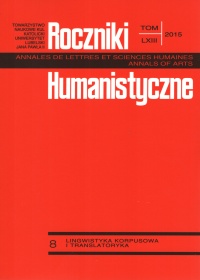Some Thoughts on Primitives, Predicates and the Meaning of Terms in Ontologies and in General Vocabulary
Abstract
The article deals with two terms: “primitives” and “predicates” found in technical reports on ontology, on natural languages and in programming languages. The way they are used seems to confirm the Latin phrase: Si duo dicunt idem non est idem. However, one must attenuate this supposition which is due to the fact that the descriptions of ontologies, of the programming code and of the natural language texts are made in formal language. The obtained descriptions have two aspects: ‘formal’ and ‘lexical’ or ‘semantic’. Both predicates and primitives appear in linguistics and computer science on the formal level, and not on the ‘lexical’ one. A glance at the Charter of Fundamental Rights of the European Union as the base-text used to develop a micro-ontology leads to the conclusion that the authors introduce the concept of dignité humaine ‘human dignity’ by an arbitrary stipulative definition rather than by reporting one. The meaning assigned to this term does not coincide with any of the registered meanings of this expression in the standard language.
References
Antoniou Grigoris, Franconi Enrico, and van Harmelen Frank, 2005, Introduction to Semantic Web Ontology Languages [in :] N. Eisinger and J. Maluszynski (Eds.) REWERSE 2005, Springer-Verlag .
Bachimont Bruno, 2000, Engagement sémantique et engagement ontologique : conception et réalisation d’ontologies en ingénierie des connaissances [in :] Ingénierie des connaissances. Evolutions récentes et nouveau défis, Charlet, Jean et al., Eds, Eyrolles, 305-323. On-line: https://www.utc.fr/~bachimon/dokuwiki/_media/fr/ontologie-icbook.pdf. [Consulté le 19 Juillet 2015].
Bogacki Krzysztof & Karolak Stanisław, 1991, Fondements d’une grammaire à base sémantique. [in :] Lingua e Stile, 26(3), 309-345.
Breuker Joost, Hoekstra Rinke, Boer Alexander, van den Berg Kasper, Rubino Rosella, Sartor Giovanni, Palmirani Monika, Wyner Adam, and Bench-Capon Trevor, 2007, OWL ontology of basic legal concepts (LKIF-Core). Deliverable 1.4, http://www.estrellaproject.org/doc/D1.4-OWL-Ontology-of-Basic-Legal-Concepts.pdf [Consulté le 19 Juillet 2015].
Buitelaar Paul, 2010, Ontology-based Semantic Lexicons: Mapping between Terms and Object Descriptions, [in :] Hu-Ren Huang & al. (eds.) Ontology and the Lexicon. A Natural Language Processing Perspective, , 212-223. Cambridge : Cambridge University Press.
Charte des droits fondamentaux de l’Union Européenne, 2000, Journal Officiel des Communautés européennes. http://www.europarl.europa.eu/charter/pdf/text_fr.pdf. [Consulté le 19 Juillet 2015].
Declerck Gunnar, Audrey Baneyx, Xavier Aimé, Jean Charlet, 2012, A quoi servent les ontologies fondationnelles ? [in :] 23èmes Journées francophones d’Ingénierie des Connaissances (IC 2012), June 2012, Paris, France. 67-82.
Gross Gaston, 2012, Manuel d’analyse linguistique. Approche sémantico-syntaxique du lexique. Villeneuve d’Ascq : Presses Universitaires du Septentrion, coll. « Sens et structures ».
Gruber Thomas, 2009, Ontology [in :] Encyclopedia of Database Systems, Ling Liu and M. Tamer Özsu (Eds.), Springer-Verlag. http://tomgruber.org/writing/ontology-definition-2007.htm. [Consulté le 19 Juillet 2015].
Guarino Nicola, Oberle Daniel, Staab Rudi, 2009, What is an Ontology ? [in :] Staab S. & Studer R. (eds.) Handbook on Ontologies. 1-17. Springer Dordrecht Heidelberg.
Hernandez Nathalie, 2005, Ontologies de domaine pour la modélisation du contexte en recherche d’Information. Thèse de doctorat, Université de Toulouse.
Hirst Graeme, 2004, Ontology and the lexicon [in :] Staab S. & Studer R. (eds.). Handbook on ontologies, 209-230. Springer, Berlin Heidelberg.
Hoekstra Rinke, Breuker Joost, Di Bello Marcello, and Boer Alexander, 2007, The LKIF Core ontology of basic legal concepts [in :] Casanovas, P. et al. (ed) Proceedings of the Workshop on Legal Ontologies and Artificial Intelligence Techniques (LOAIT 2007). Estrella.
http://www.leibnizcenter.org/docs/hoekstra/Hoekstra-LOAIT07.pdf [Consulté le 16 Août 2015].
Lacot Xavier, 2005, Introduction à OWL, un langage XML d’ontologies Web. http://lacot.org/ public/introduction_a_owl.pdf. [Consulté le 19 juillet 2015].
Manuel de référence du langage B Version 1.8.5, 2002, Accessible on-line : http://www.irit.fr/~Martin.Strecker/Teaching/Common/B_manuel_de_reference.pdf. Consulté le 29 septembre 2015.
Mondary Thibault. 2011, Construction d’ontologies à partir de textes. L’apport de l’analyse de concepts formels. Thèse de doctorat de l’Université Paris-Nord - Paris XIII.
Morin Emmanuel, 1999, Extraction de liens sémantiques entre termes à partir de corpus de textes techniques. Thèse en Informatique, Université de Nantes, Décembre 99.
Saint-Dizier Patrick,Viegas Evelyn (eds.), 1995, Computational Lexical Semantics. [Online]. Studies in Natural Language Processing. Cambridge: Cambridge University Press. Available from: Cambridge Books Online <http://dx.doi.org/10.1017/CBO9780511527227> [Consulté le 02 août 2015].
Séguéla Patrick, 1999, Construction de modèles de connaissances par analyse linguistique de relations lexicales dans les documents techniques. Mars 2000. Thèse de doctorat. Toulouse III.
Staab Steffen & Studer Rudi (eds.), 2009, Handbook on Ontologies, International Handbooks on Information Systems. Springer-Verlag Berlin .Heidelberg.
Le Trésor de la Langue Française Informatisé, Nancy, CNRS Editions, http://atilf.atilf.fr/tlf.htm
Weinland Daniel, Ronfard Remi, Boyer Edmond (2006) Automatic Discovery of Action Taxonomies from Multiple Views (in :) Andrew Fitzgibbon and Camillo J. Taylor and Yann LeCun. IEEE Conference on Computer Vision and Pattern Recognition (CVPR ’06), Jun 2006, New York, United States. IEEE Computer Society.1639–1645.
Wierzbicka Anna, 1969, Dociekania semantyczne, Wrocław: Ossolineum.
Wierzbicka Anna, 1971, Kocha, lubi, szanuje. Medytacje semantyczne. Warszawa: Wiedza Powszechna.
Wierzbicka Anna, 1975, Rozważania o częściach ciała [in :] E. Janus (Ed.) Słownik i semantyka. Definicje semantyczne. Wrocław: Ossolineum, pp. 91-103.
Wierzbicka Anna, 1980, Lingua Mentalis. The Semantics of Natural Language. Sydney: Academic Press.
Wierzbicka Anna, 1996, Semantics: Primes and Universals. Oxford: Oxford University Press.
Wierzbicka Anna, 2004, Polish and Universal Grammar [in :] Studies in Polish Linguistics 1, 9-27.
Copyright (c) 2015 Roczniki Humanistyczne

This work is licensed under a Creative Commons Attribution-NonCommercial-NoDerivatives 4.0 International License.





